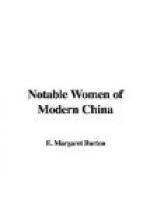Again she reported the following year, “A special effort was made to throw away the old, parrot-like way of learning. As the teachers needed instruction as well as the pupils, sometimes, the text-books were taken away. The teachers were required to tell a story every day; and with the story a verse of the Scriptures, meant for a peg on which to hang the tale, was committed to memory by the girls. The teacher would write six easy characters each afternoon on the blackboard for the girls to copy before going home. Thus the girls learned how to listen, to memorize, and to write. Since the number of girls increases perceptibly when we have a little English I use it as a bait. By Miss Merrill’s consent, help was secured from the boarding-school in teaching half an hour of English every day in the two city schools.”
In December of 1904, at the annual meeting of the Central China Methodist Mission, Miss Stone was given the entire charge of the Bible Women’s Training School. A letter to a friend shows the keen delight with which she entered upon this new work: “I am enjoying the work very much,” she wrote. “It seems so strange to me that these women are like my old friends. They are free and at home with me, and I can say already that I love them.... I wish you could be here just to look at them and see how willing they are to be taught.” It was her desire to live in the school that she might share the life of the women outside of class hours, but after a few days’ trial this proved too wearing, and the doctor insisted upon her giving it up, greatly to her own disappointment and that of the women.
She was very eager that these women, all of whom were from families of small means, and were supported by scholarships while at the school, should do something towards meeting at least a part of their expenses. A few months after she had taken charge of the work she joyfully wrote Mrs. Joyce:
“An industrial department is actually started, and we have found it helpful to a great many. We are not attempting fancy things, but we strive to make useful articles and things that we use ourselves, or for sale. So far we have made only babies’ shoes, which we sold to foreigners living at Kuling, and some hemstitched handkerchiefs, and some plain knitting. Each one of them is given fifty cash a month for spending money, and it will leave a good balance for the school. They work from three to five P.M., so their studies are not neglected thereby. This work means also a livelihood to a poor old lady.... She was in the hospital for over three years, living on the charity money the doctor earned. I felt that she could be more useful and happy by teaching sewing, since she is a beautiful needle worker, so the school boards her and gets her teaching for the women. I have been quite happy in this work, because I feel the women are learning self-respect and to look upon manual labour as something honourable. I have a chance to tell them about




